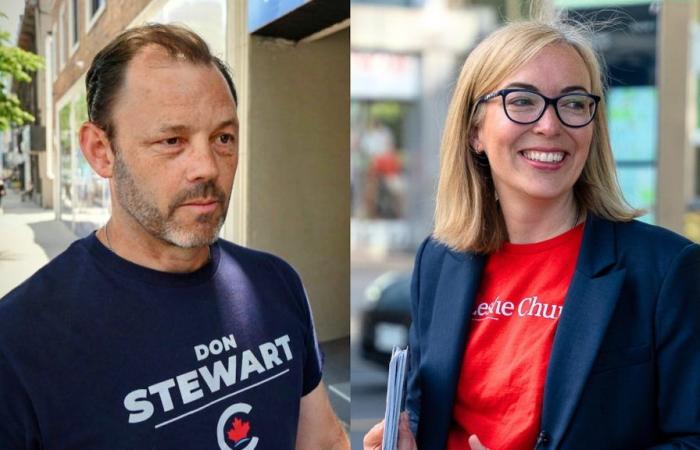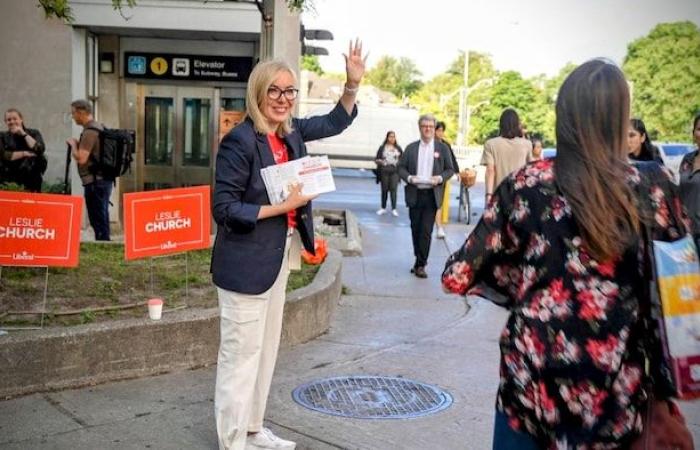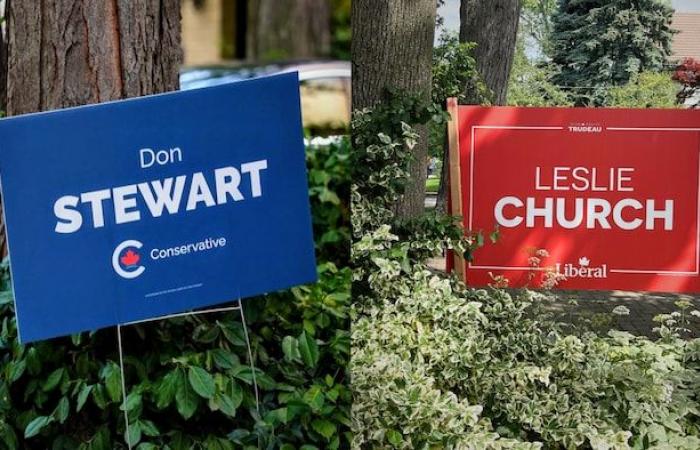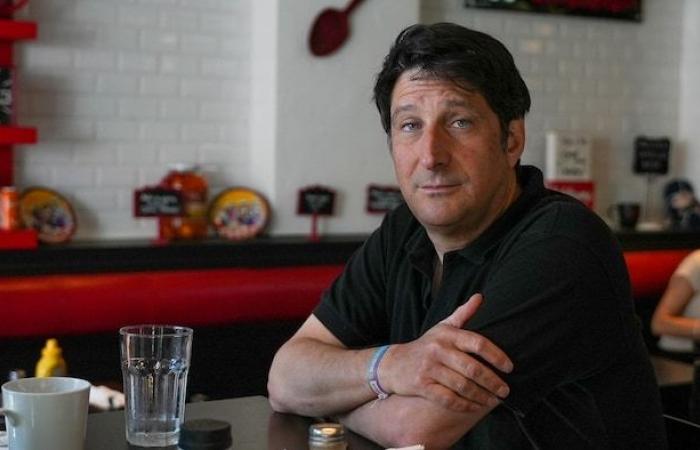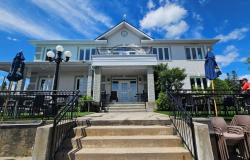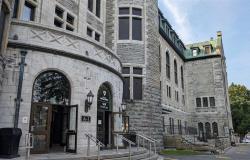We are waiting for him in front of his constituency office. The Conservative candidate in Toronto–St. Paul’s meets at 1 p.m. with a small army of volunteers to go door to door. Don Stewart – that’s his name – declined all of our interview requests.
Around 1:20 p.m., an employee leaves her office nervously, cell phone in hand. She heads towards the nearby metro station and returns a few moments later with her candidate. He wears a t-shirt with his image. We’re trying a simple question.
Open in full screen mode
Conservative candidate Don Stewart has been trying to take over a Liberal stronghold for more than 30 years.
Photo: Radio-Canada
What do you hear when you go door to door?
we ask him.
No answer. Don Stewart looks at his colleague and hurries on. Both seem confused. She tells us : Don’s going to go inside now.
A few seconds later, another banal question: Do you think you will win?
I have to cross the street.
Mr. Stewart may not be a talker with the media – he doesn’t want to risk any missteps – but his message resonates with the electorate. Blue signs dominate several streets in the constituency, although it is considered a liberal stronghold. The last time Toronto–St. Paul’s voted blue in 1988, when Brian Mulroney was prime minister.
I consider myself undecided, but this time, I will vote conservative
says David, a father who was running to take his children to school when we met him in the constituency: It’s definitely time for a change.
Open in full screen mode
Leslie Church, Liberal candidate, is a former chief of staff to Minister Chrystia Freeland.
Photo: Radio-Canada / Benoit Roussel
Liberal candidate Leslie Church hears this thirst for renewal at the door but does not take offense. Voters, she believes, above all want to see a new way of doing politics
.
Former chief of staff to Chrystia Freeland, Ms. Church has big shoes to fill. She is trying to succeed former minister Carolyn Bennett and, above all, to ensure that the Liberal bastion remains red Monday evening.
She offers to accompany us, early in the morning, to the entrance to the metro station where, for an hour, she distributes her leaflets to users.
Good morning! We are fighting for housing, housing and housing.
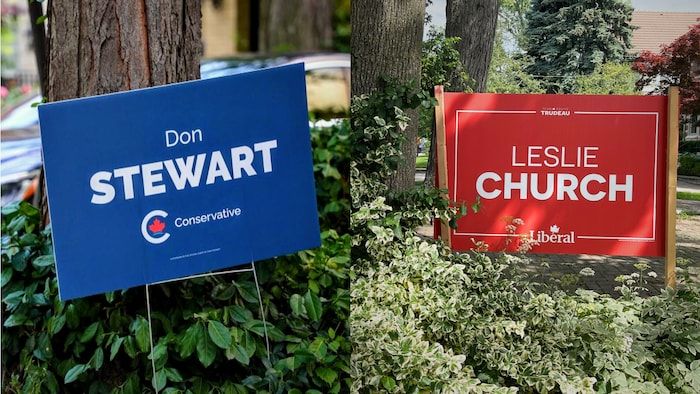
Open in full screen mode
Red and blue signs abound in the riding of Toronto–St. Paul’s.
Photo: Radio-Canada
Most passers-by rush past her without stopping. Some take the leaflet. I will vote for you
suddenly shouts an enthusiastic red-haired woman.
An older voter – Tim Hortons coffee in hand – seems less excited: I like Leslie Church, but Trudeau…
He pouted. Obviously, fatigue has set in for the Liberal leader.
Dan, a local resident who says he from the left
criticizes Justin Trudeau for sometimes being disconnected from reality
. A revealing example? Holidays luxury
which he took in Jamaica. Was it the best choice?
he asks.
Candidate Leslie Church acknowledges that some voters express frustration
when they talk about the Prime Minister, but, according to her, the other option
THE worry
even more. They fear compressions
that would come with a Poilievre government.
A few hours later, in fact, we meet Lynda, an older voter who is walking her dog. She tells us to be terrified
by the Conservative leader, whom she compares to a mini-Trump
: Maybe Trudeau isn’t perfect, but he’s the less bad of the two.
A large Jewish community
Monday’s by-election will also be an opportunity to assess the impact of the Israeli-Palestinian conflict and, above all, the Canadian government’s response to the Jewish community. About 15% of voters in Toronto–St. Paul’s identify with it.
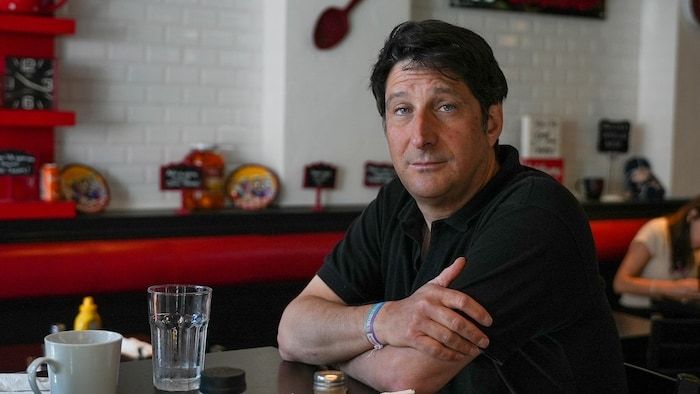
Open in full screen mode
Ben Mogil says he doesn’t feel like the Liberal Party is really fighting anti-Semitism.
Photo: Radio-Canada
I would have voted for Justin Trudeau’s party if I had the impression that he was really fighting anti-Semitism
, Ben Mogil tells us. He has always supported the Liberals, but this time, he will vote for Pierre Poilievre’s troops.
His case is not isolated. If, historically, the Jewish community has supported the Liberal Party, Stephen Harper’s firm support for Israel and, more recently, that of Pierre Poilievre for the Jewish state are changing the situation.
Today, conservatives are more popular than liberals in the Jewish community
explains Robert Brym, professor emeritus at the University of Toronto. And this is, among other things, because conservatives are more uncompromising in their support for Israel. This appealed to many Jews.
Will it be enough to influence Monday’s result? The proportion of Jewish voters remains marginal, Mr. Brym acknowledges, and, of course, there are differences within the community. But in a race that promises to be close, perhaps, he says, it could make tip the scales
.

